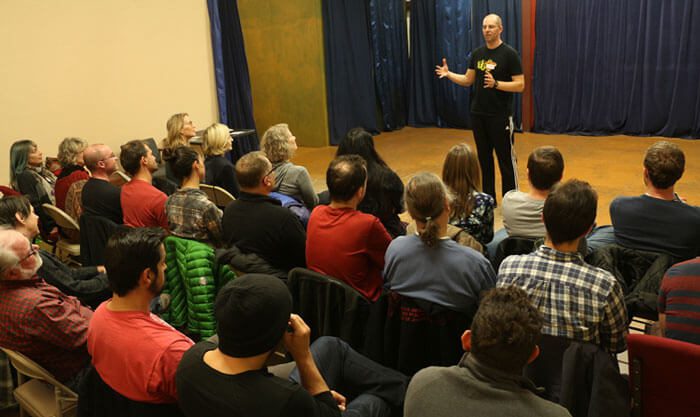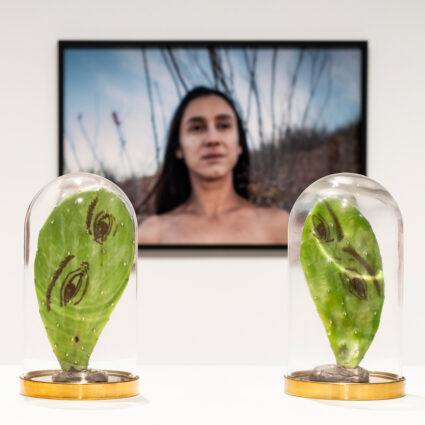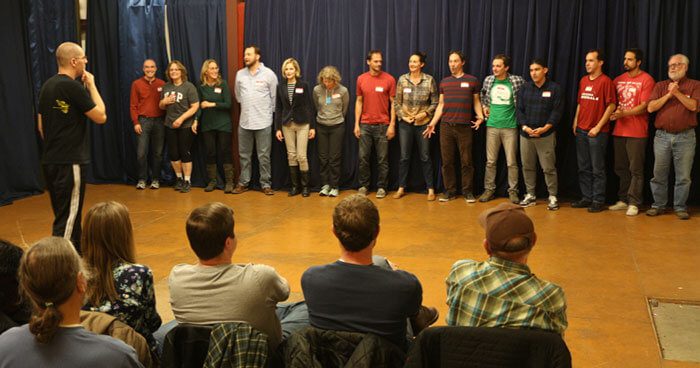
Warehouse 21, Santa Fe
December 2, 6 pm (monthly performance)
I would like you to imagine you are standing alone on a stage. A simple brown folding chair stands in front of you. The audience of about forty people looks up at you, waiting, expectant. You are dressed in your street clothes. Suddenly, a man in a t-shirt and shorts wanders onto the stage and says, “Mary, is that you?” He’s talking to you, but your name is not Mary. The only direction you’ve been given is to create a scene about space exploration. “I didn’t know you’d been assigned to Mars’s station fifteen! What a coincidence!” he says. There is an awkward moment of silence, and then you begin to speak. “Oh, hello, Robert. Listen, there’s a lot that I’ve been wanting to say to you since I left Earth . . .” Now you are off and running. From such humble beginnings a complex scene emerges. You are now doing theatrical improvisation.
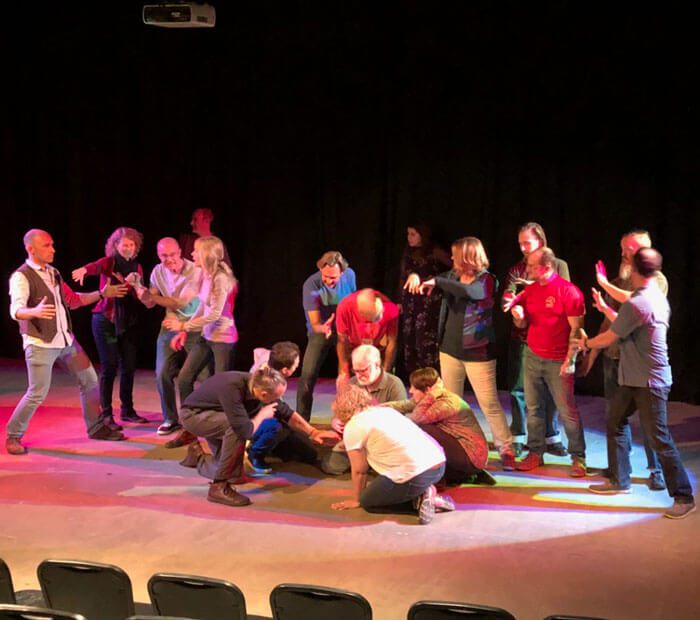
Improv is often denigrated as the lowest form of theater, or as a game reserved for corporate events, or middle-school drama classes. Gabe Smith of Santa Fe Improv states, “Historically improv has been treated as a tool to hone the art of acting, rather than an art in and of itself.” Even the activities and exercises of improv are often referred to as “games.” But I don’t think improv gets its fair shake. To create from nothing is both one of the simplest and most difficult things we can do. Kita Mehaffy, Managing Director of SFI [not to be confused with the Santa Fe Institute], describes the experience of improvising as being “very much like mindfulness and, for me, it’s mindfulness on its feet.” When we improvise, it feels like our brain is being used in the way it was intended: generating from nothing, strategizing, finding stories and patterns. One can’t help but be excited about tapping into that primal creativity. Therefore, improv is a web of contradictions: it is a game but deadly serious; it is at once fun and hard work, planned and spontaneous. Additionally, more and more research is demonstrating the powerful benefits of improvising, such as greater social awareness and listening ability—and not just for children but for adults and the elderly.
When we improvise, it feels like our brain is being used in the way it was intended: generating from nothing, strategizing, finding stories and patterns.
These psychological and social benefits compelled Ben Taxy to found Santa Fe Improv. The organization started small. According to Taxy, “My wife and I had just had a baby, and I was working all of the time and my wife made me get out of the house and start teaching. And it grew from there.” Since then, SFI has become an improv powerhouse in Santa Fe. They now offer two advanced classes, one intermediate class, and one beginner class. They also have performance teams and will be performing at Warehouse 21 on the first Sunday of every month starting in December. At the core of SFI’s philosophy is the belief that improv can develop the “skills of being present, listening and communicating,” according to Mehaffy. It’s courageous to go up onstage with nothing prepared. For Gabe Smith, “courage is a tipping point where curiosity passes fear.” Smith says that most SFI students have day jobs as lawyers, engineers, or in other non-theatrical fields. Erin McSherry, City Attorney for Santa Fe and student of SFI, describes it as “my out-of-the-box activity. Which I feel like I have to do.” For McSherry, SFI is really needed in the community. “There was nothing like that when I moved here the first time. One thing I’m really enjoying about this is that people are at a similar level.” If you’re not already convinced, give improv a try and see for yourself. SFI’s next public performance will take place at Warehouse 21 on December 2, 6 pm.
You can learn more about the organization, class sign-up, and other happenings at their website: santafeimprov.com.
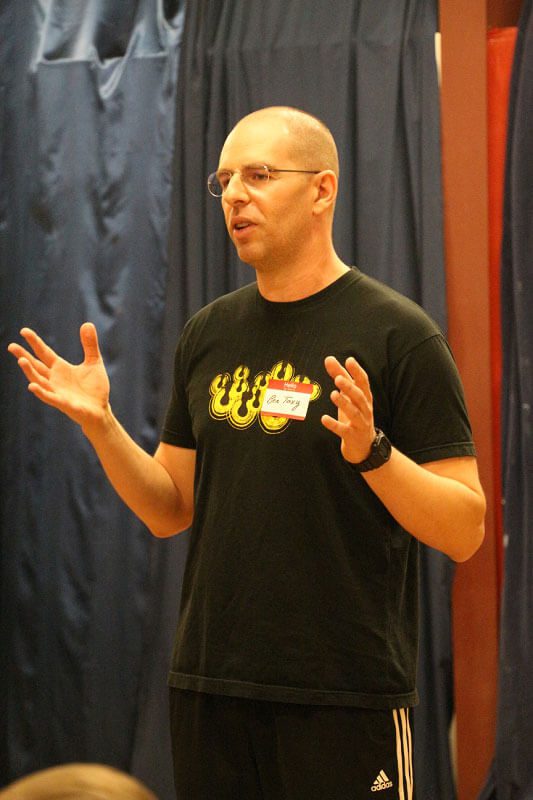
Three Performances to Catch in December
The Santa Fe Playhouse presents The Importance of Being Earnest, the farce that came to define the peak of Oscar Wilde’s career and a treatise on nineteenth-century Aestheticism. Fun, pretentious, and suited for all ages, Earnest promises to be delectable holiday fair with plenty of wordplay, unlikely to offend anyone but a Victorian dowager. The play is crammed with lines that sound like they sprang straight from Maggie Smith’s mouth on Downton Abbey. It is a rollicking and wry good time that also makes you think a bit—but mostly about British manners and society. The play opens at the very start of December and runs until the sixteenth.
For tickets: santafeplayhouse.org.
Local playwright Talia Pura will be premiering her show Perfect Love with Blue Raven Theatre December 6-23 at Warehouse 21. “Perfect Love looks at love and how difficult it is to truly find perfect love. The play consists of a collection of stand-alone playlets and monologues, written for four actors: a young man and woman, and a middle-aged man and woman.” It sounds like a perfect play for a first date—or, um, on second thought, maybe not—but it is always important to support local talent.
For tickets: blueraventheatre.com.
Adobe Rose will present their annual performance of The Ultimate Christmas Show (abridged) on weekends between Friday, November 23 and Sunday, December 9. Written by Reed Martin and Austin Tichenor and directed by Mariah Olesen, the show is “raucous, witty, adult-smart yet kid-friendly holiday fun that melds musical comedy and political satire.” If you love going to Christmas shows but find them too saccharine, then this might be just the holiday show for you.
For tickets: adoberosetheatre.org.
